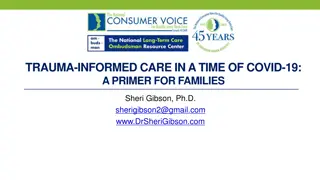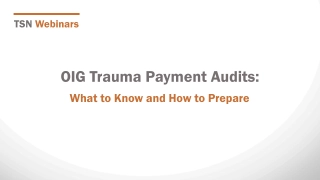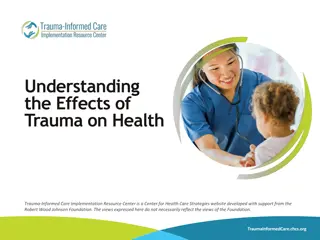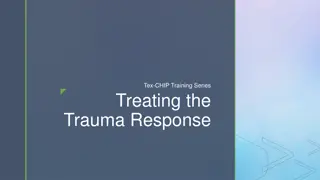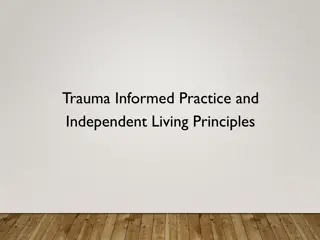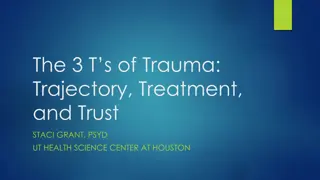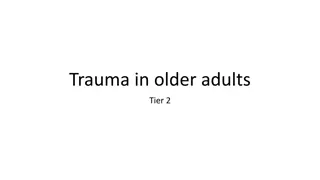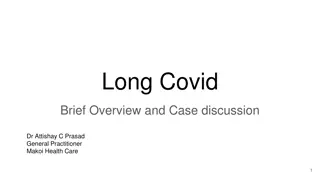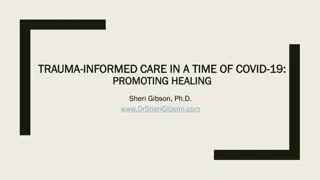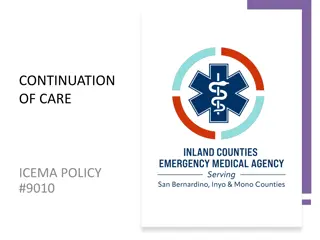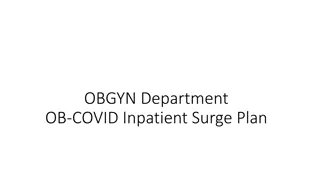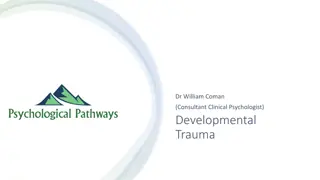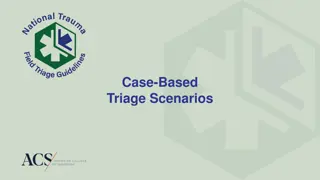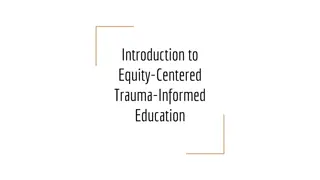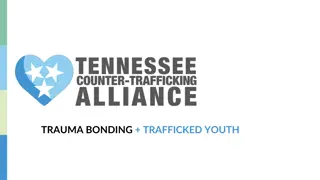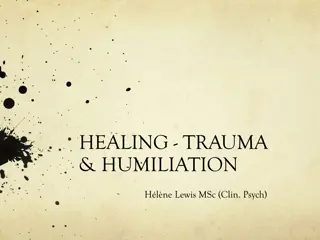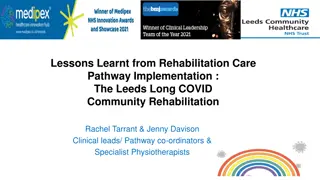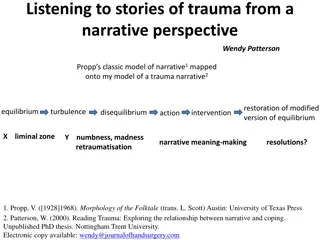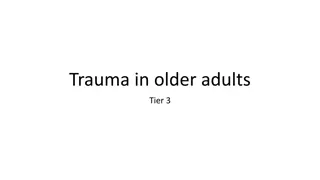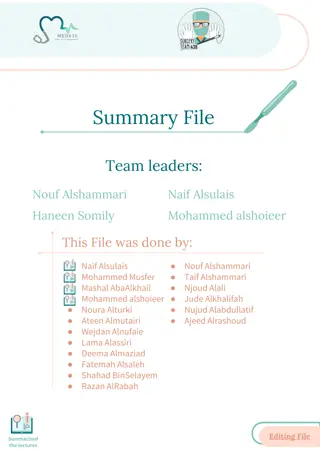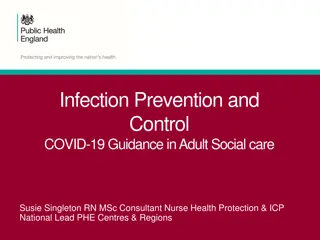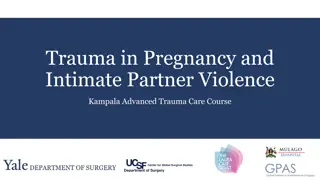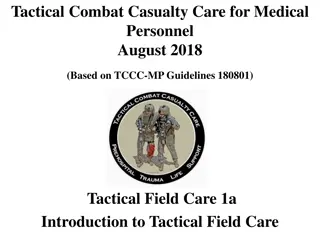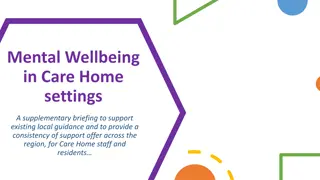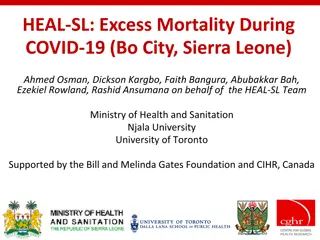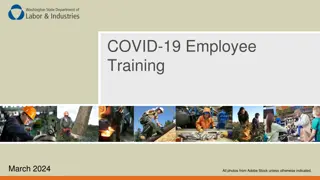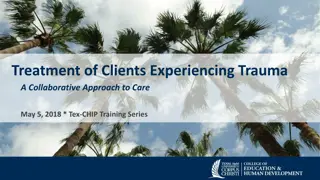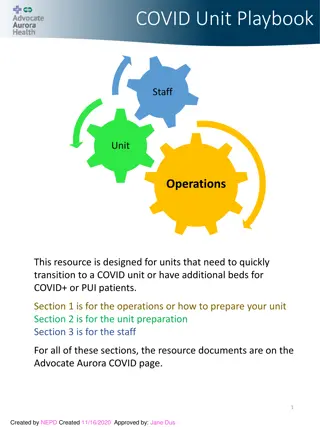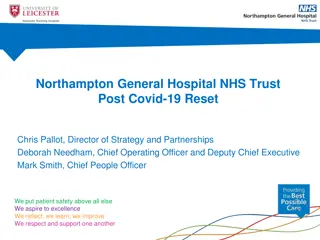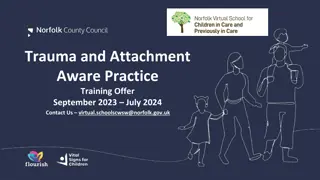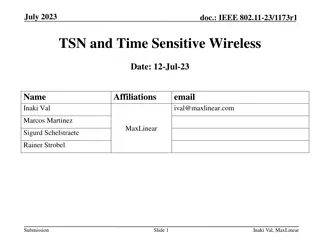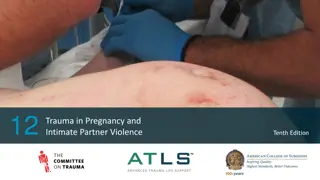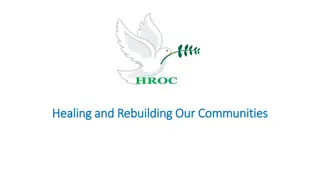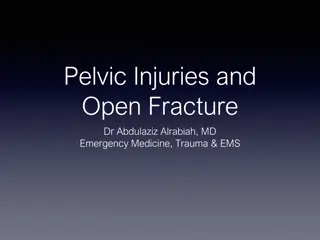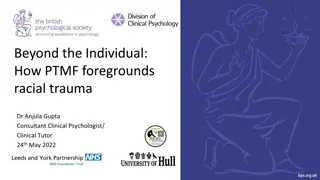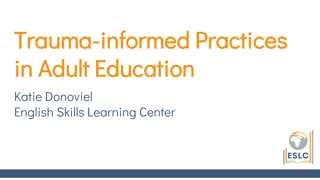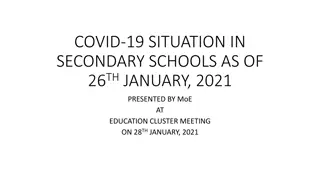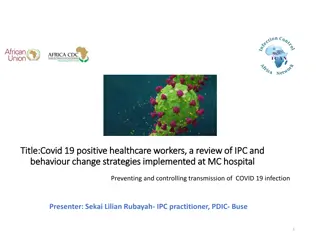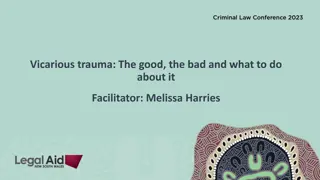Understanding Trauma-Sensitive Care for Students During COVID-19
In this presentation by Monique Johnson, LCSW, the importance of trauma-sensitive and responsive care for students during COVID-19 is emphasized. It discusses the impact of trauma, different types of trauma youth may experience, stress reactions, and protective factors. Participants are guided to consider various situations children may face, what is needed for them to thrive post-trauma, and how to support them effectively.
Download Presentation

Please find below an Image/Link to download the presentation.
The content on the website is provided AS IS for your information and personal use only. It may not be sold, licensed, or shared on other websites without obtaining consent from the author. Download presentation by click this link. If you encounter any issues during the download, it is possible that the publisher has removed the file from their server.
E N D
Presentation Transcript
Trauma Sensitive and Responsive Care for Students During COVID-19 Presenter: Monique Johnson, LCSW
TRAUMA HIGHLY TOXIC AND STRESSFUL SITUATIONS THAT CAUSE LASTING EFFECTS
Stress: The bodys reaction to any change that requires an adjustment or response Positive Normal and part of healthy development Ex. Stressed about a test, receiving immunization shots Tolerable Unexpected, but has the tools to overcome it (being prepared or have coping skills) Ex. Getting into a fender bender, but have a license and insurance- this is a headache, but have the tools to overcome it, even if it is just the thought process Toxic (TRAUMA) Strong, frequent and/or prolonged adversity without adult support- affects brain development and takes a toll on physical/mental health Ex. Physical and emotional abuse, chronic neglect, caregiver substance use, exposure to violence, accumulated burdens of family economic hardship
Various Types of Trauma Youth Experience family member diagnosed with a mental illness physical/emotional neglect community violence natural disaster abandonment sexual abuse PANDEMIC human trafficking physical abuse divorce parent/caregiver alcoholic/addict
ACTIVITY DISCUSS IN GROUPS OR THINK TO YOURSELF: - What other situations are not captured that we know children experience? - What is needed for a child to thrive after these experiences? - Now that you know various types of trauma, what can you do to support children who have these experiences?
Protective Factors Resiliency Belief that a family member loves you Other people help take care of you and belief that they love you Relatives who make you feel better when you re sad or worried Neighbors/Friends parents seem to like you Other adults (teachers, coaches, youth leaders, or ministers) able to help you Family member care about how you re doing in school Family, neighbors, and friends talk often about making life better Rules in your house and expected to keep them Almost always able to find someone trusted to talk to when feel really bad People notice that you are capable and could get things done Independent and a go-getter Belief that life is what you make it
YOUR RESPONSIBILITY Provide scholars with what they need knowing that they have experienced traumatic situations 1. SLIs have a willingness and skills to provide support to scholars who have trauma 2. Ensure YOU and SCHOLARS are safe 3. Support scholars transition through the pandemic 4. Foster a culturally responsive and safe Freedom Schools program
YOUR RESPONSIBILITY: SERVANT LEADER INTERN SKILLS Coachable and Teachable Empathetic vs. Sympathetic Passionate about IRC and other programming, program goals, and the CDF Freedom Schools movement Committed to connecting to each scholar
YOUR RESPONSIBILITY: SAFETY PLANNING 3 Non-Secrets (1. hurting yourself, 2. someone is hurting you, 3. you hurting someone else) SLI supports to engage challenging scholars: SC/PD/ED, JSLs and volunteers (only if trained) SLIs training on tools and techniques of self-regulation
YOUR RESPONSIBILITY: BUILD RESILIENCY FROM COVID-19 It may seem that we are over the initial shock of the pandemic, but even more than a year later, we are not back to the norm and uncertain of what happens next Scholars are still looking for guidance and reassurance This summer may be the first time a youth is getting back engaged with other peers in-person Model flexibility, patience, creative engagement strategies, problem solving, and compassion Mental health Allow them to feel comfortable sharing their frustrations, fears, and concerns Keep explanations age-appropriate (Freedom School sites serve Level 1 - Level 4) Physical Health Maintain basic hygiene sanitation practices; follow your state s health and safety mandates Outdoor activities: playing outside, taking a walk, etc.
YOUR RESPONSIBILITY: CULTURALLY RESPONSIVE AND SAFE ENVIRONMENT Recognize your fellow SLIs for their commitment (ex. Finding creative ways to connect with a scholar- bring up in debrief and recognize them for that) Use the tools and techniques of self-regulation w/ yourself to provide support and use techniques with scholars Use daily debrief to foster a supportive culture Ensure that all of the components of the classroom are accounted for before program starts and throughout the summer for consistency
YOUR RESPONSIBILITY: BUILD RESILIENCY ALWAYS COMPETENCE- notice that a child is doing something right gives them the opportunity to develop the skills to feel competent- undermined when youth are not allowed to recover themselves after a negative experience or mistake CONFIDENCE- emerges as youth develop competence in particular areas- praise efforts rather than actual results- has to be realistic praise as opposed to excessive praise that children recognize as false CONNECTION- foster relationships with people outside of the family (peers, teachers, coaches, community, etc.) CHARACTER- help the youth understand how their behavior affects others, and to define a clear sense of right and wrong CONTRIBUTION- encourage youth to contribute to the wellbeing of others- learn that contributing leads to positive emotion and an exchange of support with others COPING- teach a variety of healthy coping strategies- less likely to turn to dangerous quick fixes when faced with adversity CONTROL- emphasize that privileges and respect are earned by demonstrating responsibility to help them make smart choices and feel a sense of control
FOSTERING RESILIENCY Resilience is the human capacity to face, overcome, and be strengthened by or even transformed by the adversities of life. Everyone faces adversities; no one is exempt With resilience, children can triumph over trauma. Without it, trauma triumphs. International Resilience Project & Bernard Van Leer Foundation
THE GIFT OF RESILIENCY Research has shown that resilience which can be learned - can mitigate the impact of adverse childhood experiences and produce better health and educational outcomes. At the heart of resiliency is the need to cultivate healthy social-emotional development in children and families. Intrapersonal skills self-regulation, self-reflection, creating and nurturing sense of self and confidence Interpersonal skills establishing safe, stable and nurturing relationships
There can be no keener revelation of a society s soul than the way it treats its children. Nelson Mandela
REFERENCES (2014). Protective factors and resiliency (futures without violence). ACEs Connection. https://www.acesconnection.com/g/foster-children-parents-support-network/blog/protective-factors-and- resiliency-futures-without-violence (2019). Resilience to ACEs: some children thrive despite ACEs. Minnesota Department of Health. Brown, B. (2016). Brene Brown on empathy vs. sympathy. https://www.youtube.com/watch?v=KZBTYViDPlQ Ginsburg, K & American Academy of Pediatrics. (2014). The 7 Cs: The Essential Building Blocks of Resilience. Fostering Resilience. http://www.fosteringresilience.com/7cs.php Sievering, K. (2020). Helping Children Cope With Changes Resulting from COVID-19. National Association of School Psychologists. https://www.nasponline.org/resources-and-publications/resources- and-podcasts/school-climate-safety-and-crisis/health-crisis-resources/helping-children-cope-with- changes-resulting-from-covid- 19?utm_source=delegate_message&utm_medium=email&utm_campaign=DM_IN_0320 Reports and Working Papers: Toxic Stress. Harvard University- Center on the Developing Child. https://developingchild.harvard.edu/science/key-concepts/toxic-stress/
Thank You! Monique Johnson, LCSW MK-TI Social Work Consulting mktisocialworkconsulting@gmail.com (317) 721-6385


